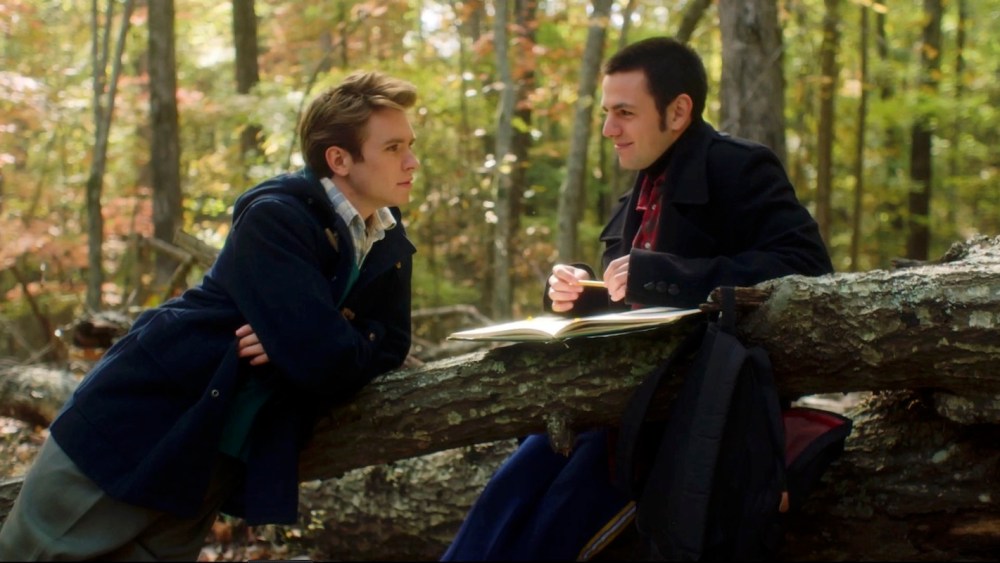A Treacly Gay Coming-of-Age Tale
The autobiographical film is always an attempt to embalm and embrace what’s long past. To look back and reshape one’s own memories with the help of a camera is to wrestle not just with what happened but with the ripple effects of what’s come since. “Before We Forget” finds a filmmaker struggling to edit a deeply personal film based on a youthful crush that still haunts him. Memory and filmmaking blend as the film shuttles back and forth between past and present. Yet even with this intentionally meta construct, Juan Pablo Di Pace and Andrés Pepe Estrada’s film cannot escape the familiar tropes and trappings of the gay coming-of-age film it’s stuck depicting.
“Before We Forget” opens with a camera being held by a filmmaker in the present and by his younger self decades before. With his rugged beard and his moppish salt and pepper hair, Di Pace (who also wrote the film), plays Matias in his 40s. Meanwhile, Santiago Madrussan plays Matias in his youth, all wide-eyed and eager to take in the Italian town of Duino around him. Young Matias has arrived there to attend an arts college — and also to place himself as far away from his native Argentina as he can. It’s there thtat he meets Alexander (Oscar Morgan), a charming young Swedish boy with whom he’s instantly taken. Soon, they’re inseparable, even as Alexander’s antics at school start slowly getting out of hand.
Witnessing all this is Matias’ friend Polo (Tomás Kirzner), who’s come all the way from Argentina to visit him in Duino. He arrives with a camcorder, ready to capture their European adventure as best as he can. It’s through his eyes, and through his grainy video footage, that we see how the furtive glances between Alexander and Matias suggest there may be more than a mere friendship building between them. Only, as the presence of present-day Polo, now Matias’s producer (played by Juan Cruz Márquez de la Serna) quickly suggests, what we’re watching aren’t actual flashbacks. They’re scenes being cut by Matias ahead of a looming film festival deadline.
Twenty-five years after the fact, he’s finally decided to turn those pivotal months he spent in Duino (including Christmas at Alexander’s estate) into a feature film. Only, as he keeps looking at the footage, it’s clear he’s still struggling with the events that took place all the way back in 1997. Except even that description misrepresents what we’re watching: Matias’s editing is barely made evident. What we watch are fully realized (and scored and color-corrected) scenes. The film aims to be about the process of editing a film but it never shows the messiness (whether technical or emotional) of that process. Instead, we’re called to watch Di Pace pace around Matias’s apartment as he stares wistfully past his monitor screen.
With its coastal Italian backdrop and its core focus on the melancholy pangs of teenage yearning — not to mention its eventual emphasis on the way family can help shape a young man’s understanding of his budding sexuality — there’s no mistaking what film “Before We Forget” is indebted to. Close to 10 years since it was first released, “Call Me by Your Name” remains an unavoidable high-water mark for these sun-dappled queer coming-of-age tales. And yet the comparison, unfair and expected as it may be, does no favors to Di Pace and Estrada’s all too earnest twist on what’s become now a well-worn genre unto its own.
Films as disparate as “Esteros,” “Of an Age,” “My Summer of Love” and “Summer of 85” have, for decades now, offered variations on this very theme. There is nothing, these films insist, quite like that first blush (and flush) of love (and lust). Entire lives and visions of queerness are built on the backs of such memories, especially if such encounters were fleeting and live on as mere hazy memories lodged deep within. That is very much the case here, with Matias clearly putting undue importance on what happened between him and Alexander all those years ago. Only here, the filmmaking pair try to offer both that very kind of film and also a meta-commentary on what those films may mean for its makers.
Except, the present-day Matias section feels adrift and only manages to blunt any narrative momentum its (fictionalized) flashbacks start to build. Moreover, since from the very beginning we know we’re watching a film-in-the-making, the stilted dialogue of the 1997 sections (not to mention the rather wooden performances of its actors) stick out for all the wrong reasons. Are Di Pace and Estrada intentionally commenting on how cloying those scenes often feel in films like these? Or have they leaned in too hard to the heightened melodrama of such scenarios and ended up with a near-parody of them that feels all the more inauthentic because of the earnestness that surrounds them? Either way, the filmmaking/memory metaphor the film’s title insists on ends up feeling rather overdetermined.
The film’s heart is clearly in the right place. For those who came of age (and maybe even came out) in the late ’90s and early 2000s, the film captures something quite truthful about how hard such a journey felt. Especially, as is the case for Matias, when his own path toward self-discovery required him to travel miles and miles away from where he grew up and first learned about himself. Ultimately, though, “Before We Forget” feels much too tidy (didactic, even) in how it unfolds for it to land the emotional gutpunch it so wants to deliver. Instead, this Italy-set film plays like a rather pat coming-of-age story that both lacks the maturity its older characters presumably embody as well as the winsome charm its younger ones are required to perform.

